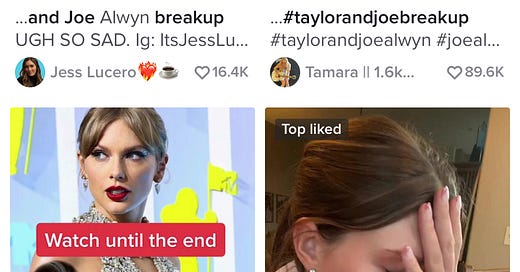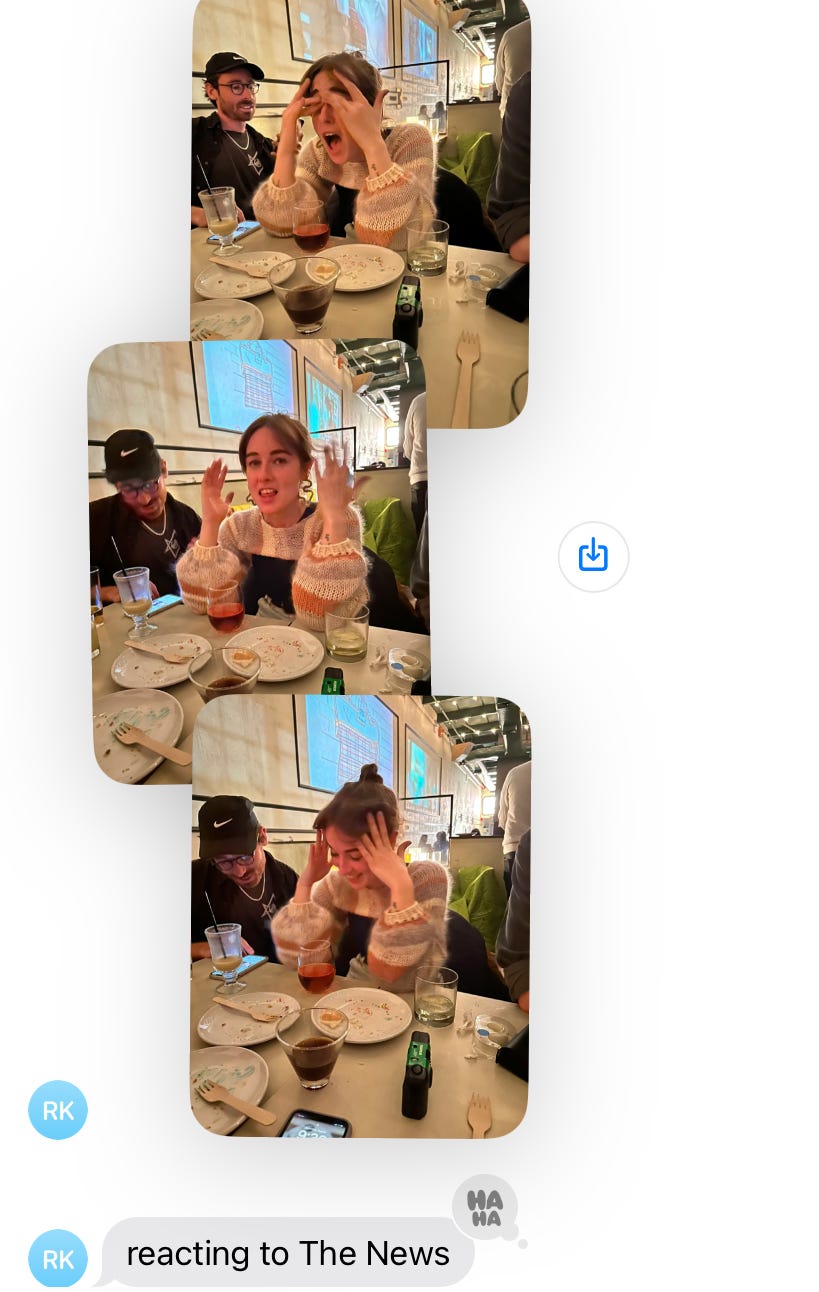Taylor Swift’s breakup is not fake news
You can trust “a source close to the pair,” but you can’t necessarily trust a source who is close to you.
Embedded is your essential guide to what’s good on the internet, written by Kate Lindsay and edited by Nick Catucci.
There’s a whole element of fandom in this that I didn’t even touch, because while the Swifties may be wrong, they do scare me. —Kate
I was at a bar when I heard about the Taylor Swift and Joe Alwyn breakup. I genuinely thought my friend Hannah, whose history with Taylor Swift and “the truth” we know to be shaky, was just parroting a TikTok rumor, until I saw the news on Entertainment Tonight’s website. I jumped over to People, which had confirmed the report with “a source close to the pair.” I ordered another glass of rosé, head in my hands.
I embarked on this particular sequence of Google searches thanks to my days as an entertainment news writer. Whenever news of a death, relationship, or breakup began to bubble up on Twitter or gossip websites, we’d wait for People, ET, or TMZ to independently report the item before running with it ourselves. Those outlets work directly with celebrity publicists and other reputable sources, and rely on maintaining those relationships. If they’re reporting something, there’s a 99.9% chance that it’s true.
Obviously, not everyone is expected to know this. But I wasn’t prepared for just how many people were going to vehemently deny the breakup news, claiming that these outlets manned by journalists and editors who must adhere to strict reporting practices were just … lying. TikTok comments are filled with people saying they don’t trust the anonymous source, that the “evidence” in the articles is flimsy, that they won’t believe it unless Taylor says it herself.
Gen Z’s lack of media literacy is something I’ve written about before, but the reaction to this breakup has really solidified the core issue for me: Having grown up online, where people often don’t get their news from the source that reported or confirmed it, but rather, an individual sharing that news in a post, Gen Z has come to trust regular people more than news websites (and forget TV news and newspapers—if it’s not online or streaming, they’re not even seeing it). They prefer to get their news from a person’s account than from behind the veil of a publication whose pursuit of clicks they believe weakens the legitimacy of its claims. While no one should have blind trust in media, Gen Z appears to have blind skepticism.
This is one of the reasons I think the Instagram gossip account DeuxMoi became so popular. We were told we weren’t getting the real story from the evil behemoth that is Big News. Instead, the account promised us information directly from the people on the ground—just don’t ask who they are. As DeuxMoi’s many flop claims have proved, these regular people have ulterior motives, too.
A perfect example of this happened early last year. A user named @aiden4aderall made a now-deleted video with text that read, “Just learned that Mason Ramsey is a regular kid bc he donated all profits from his Walmart yodel boy days to the Family Equality Council for LGBT parents.” The video went viral, only for the creator the follow up a few days later and admit it was a straight-up lie. They just wanted to see if TikTok would believe it—and TikTok did.
 Tiktok failed to load.
Tiktok failed to load.Enable 3rd party cookies or use another browser
Hank Green made a great video breaking this phenomenon down and explaining why it’s not harmless. As Jules Terpak explained in a different video that month, while misinformation plagues all generations, the reach it has today makes it even more dangerous for Gen Z. A lie can spread further and faster than ever before, kickstarted by anyone who audiences may be inclined to believe over an actual journalistic outlet.
The skepticism that should be applied to these first-person claims is instead being applied to publications, in large part because nobody is being taught how any of this works. In fairness, “a source close to the pair” does sound shaky, but people in the industry know that is almost always the publicist. Similarly, Entertainment Tonight’s phrasing— “has exclusively learned”—doesn’t mean they just overheard someone talking about it in line for coffee. It means that news was brought to them by a source they trust, orchestrated to drop the evening before Easter when it would get the least attention, not to mention a weekend when Taylor Swift wasn’t performing at any tour stops. That’s Celebrity Publicist 101.
The upside? The very point I’ve just made is being discussed all over TikTok. In the absence of formal media literacy education, users with the knowledge are sharing why, exactly, the reporting is credible, and explaining the mechanisms that make it so. But since first-person accounts carry so much weight, here’s mine:
I have Taylor Swift’s publicist in my contacts because we would be somewhat regularly in touch at my old entertainment job. She would respond to every email and request corrections to tiny errors in 300-word aggregated posts. She once gave me and a coworker Reputation tickets, and when we were trying to find the press area and worried we were too late to meet Taylor, she answered our call without as much a “hello” but simply, “You’re fine.” She already knew why we were calling. This news would not be news without the knowledge and, indeed, blessing, of a woman that powerful and competent. Or, sorry—a “source close to the pair” that powerful and competent.







The thing about "media literacy" that remains problematic (and it's not your fault!) -- journalists expect a mass audience to understand a complex set of practices and norms unique to their profession, like it's part of "civics" class (that doesn't exist).
So when I read this, I think, "but yes, that's largely the journalism industry's fault." There's no logical explanation for why celebrity media outlets are held to different responsibility standards than regular newspapers other than "understood norms developed by gossip reporters in the twentieth century that may or may not make sense in a 21st century ecosystem." Otherwise, why wouldn't Entertainment Weekly print Taylor's publiclist's name? There's no real logical reason for it, other than it's accepted in this weird corner of news.
Great defense of journalism! And,let’s be clear, it ain’t just Gen Z who lack media literacy - LAL and I appear to have A LOT of Boomer FHS classmates who more readily believe “a blogger/blogger from Paducah” over trained journalists. 🤦♂️🤦♂️🤦♂️